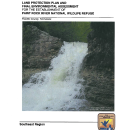The refuge lies in the Paint Rock River watershed of the Cumberland Plateau, a largely rural area that has a long history of agriculture, forestry, hunting and fishing. The Paint Rock River watershed drains into the Tennessee River. Important habitat types in the conservation partnership area include upland hardwoods, in-stream habitats and cave and karst systems.
Location and Contact Information
About Us
Paint Rock River National Wildlife Refuge serves as a critical link between nearby state and nonprofit conservation lands in Tennessee and Alabama that help conserve the Paint Rock River watershed and one of the largest contiguous tracts of hardwoods remaining in eastern North America.
Refuge habitats support threatened and endangered species including gray bats, Indiana bats, Tennessee cave salamanders, Alabama cave shrimp and freshwater mussels.
In 2016, the Service developed a land protection plan for the Paint Rock River watershed through a public process, which authorized the purchase of conservation easements and fee title lands from willing sellers in Franklin County, Tennessee through a Conservation Partnership Area. The newly acquired 87-acre tract that establishes Paint Rock River National Wildlife Refuge was donated to the Service by The Nature Conservancy and the Open Space Institute. Refuge visitors will enjoy hunting, fishing, hiking and photography, if deemed compatible with refuge use.
The vision for Paint Rock River National Wildlife Refuge is:
The refuge will protect important wildlife and habitats of the Paint Rock River watershed, a unique ecosystem that supports a high diversity of aquatic, terrestrial and karst habitats. Together with partners, the Service will help protect and improve the water quality, water quantity and hydrology of the Paint Rock River, benefitting numerous imperiled freshwater species and human communities utilizing the area's water resources. The refuge will conserve, protect and manage one of the largest contiguous tracts of hardwoods remaining in eastern North America for current and future generations. As part of a system of public and private conservation lands, the refuge will expand outdoor recreational opportunities, helping maintain a way of life and supporting local economies.
What We Do
With the establishment of this refuge, the Service will be able to fully participate with other conservation partners in the management and protection of the wildlife and habitats within the upper Paint Rock River watershed. Upland hardwood forests will be more protected from fragmentation, and connectivity between existing conservation lands would be enhanced. The water resources of the Pain Rock River watershed will be maintained or improved. Opportunities for wildlife-dependent recreational activities will be increased. Further, any cultural resources found within the refuge will be afforded protection by the Service.
It is envisioned that the refuge will:
- Protect and restore habitat for at least 15 federally listed species and three candidate species;
- Protect and maintain habitat for a diversity of fish, wildlife and plant species, including more than 40 state listed species;
- Protect some of the last remaining large tracts of eastern deciduous forests;
- Provide habitat for migratory birds; including neotropical migratory birds and other species of conservation concern; and
- Provide opportunities for a variety of wildlife-dependent recreation, including hunting, fishing, wildlife observation and photography, and environmental education and interpretation.



